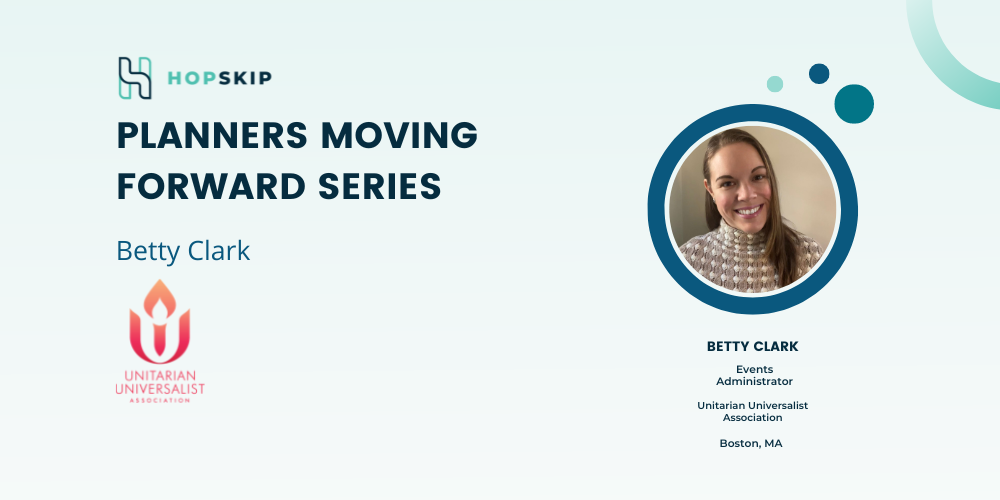This post is part of the HopSkip Planner Spotlight Series where HopSkip spotlight's planners across the industry to bring awareness of how they adapted to COVID-19, communicating and lessons learned and sharing how they are viewing the meetings and events industry in a post-pandemic world.
Name: Betty Clark
Company Name: Unitarian Universalist Association
Job Title: Events Administrator
Years of Experience: 8
How do you think you are positioned, after months of persevering with the pandemic, to take advantage of our new and disrupted meetings/events landscape?
Having helped plan and execute an event that historically took place in-person (for over 20 years) I've learned how to pivot on the spot and re-frame expectations for our audience. Now, I'm ready to pivot again if and when the time comes. Also, with this fully virtual experience under my belt I feel more prepared for planning hybrid or "multi-platform" events.
As our community moves forward with planning in-person meetings, what new technologies or processes are you implementing that you may have not looked at before?
Using apps that have a robust mobile and desktop presence allow me to manage projects on the go and stay consistently in contact. Slack and Teams, for example, have instant messaging features that allow for quick conversations and link tagging fellow team members. Virtual events platforms such as Zoom Events, and Whova are vital to the operation of our multi-platform events. Event apps allow us to keep our in-person and virtual attendees connected and allow you to organize materials in a streamlined way. These processes allow our attendees to make the very most of their experience at our event.
As we see virtual meetings transition back to face to face, hybrid meetings are beginning to be the vehicle to return to normalcy. What are your thoughts on hybrid meetings versus traditional fully in-person meetings?
I think hybrid meetings are the way of the future, and the best option for offering access to people of all physical abilities, regardless of vaccination status. This does require a certain amount of technical proficiency and training for our staff and attendees alike. This investment in re-educating our audience is vital in moving successfully into the world of hybrid events.
In your opinion, what do you think the biggest value for your attendees is in regards to returning to live events?
Having genuine face-to-face conversations in the same physical space is so important when it comes to making decisions as an association. At the same time, a huge portion of our attendee base really values the mental breaks that virtual attendance allows. We keep this in mind as we move back to in person, and make sure that the same amount of mental "space" permitted in the virtual platform is still extended to the in-person audience. That means it's okay to watch a program or workshop virtually from your hotel room if you are mentally and physically spent from a long day on the exhibit hall floor. And as event organizers, we need to normalize that self-care approach. It's not only important to the mission of the organization I work for. Guiding decisions with the self care of attendees in mind is appreciated by guests and staff alike, and fosters a sense of trust for those returning to in-person events with trepidation.
As the pandemic fades away and we return to face-to-face events what do you hope changes, either for planners or hoteliers, in the traditional RFP and proposal process as a result of all of the learnings from the last 20+ months?
I hope planners and venues will approach contract negotiations with the very real understanding that "anything could happen" and attendees are facing travel and large events with a certain degree of fear.
This post is part of the HopSkip Planner Spotlight Series where HopSkip spotlight's planners across the industry to bring awareness of how they adapted to COVID-19, communicating and lessons learned and sharing how they are viewing the meetings and events industry in a post-pandemic world.
